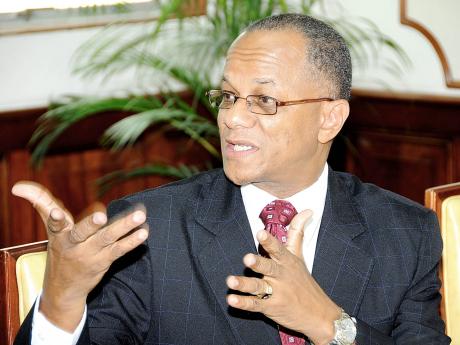Can PNP woo Arthur Williams?
Arthur Williams Jr, the second-generation politician out of the belly of the Jamaica Labour Party (JLP), has made history once this year and the stage is set for another history-making move.
With the vote on the bills to establish the Caribbean Court of Justice (CCJ) as Jamaica's final appellate jurisdiction to be taken in the House of Representatives next week, the legitimacy of the Senate as an independent arm of Parliament is set to be tested for the first time since the rulings of the constitutional and appeal courts ushered Williams and Christopher Tufton back.
For years, the governing People's National Party (PNP) has been imploring the likes of Williams and other senators to cease "kicking against the pricks" as far as the CCJ is concerned.
It is, therefore, left to be seen whether the PNP can abandon the traditionally confrontational approach and employ unconventional diplomacy to pull Williams into its fold to vote for two CCJ bills on the table.
Williams' initial 'conversion' has come about after he was cast in the political wilderness by Leader of the Opposition Andrew Holness. Holness' surrender to the Constitutional Court changed the course of history, and, possibly, the CCJ vote.
The CCJ is the judicial institution of CARICOM. Established in 2001, it is based in Port-of-Spain, with both an original and appellate jurisdiction:
In its original jurisdiction, the CCJ interprets and applies the Revised Treaty of Chaguaramas, established the Caribbean Community, and is an international court with compulsory and exclusive jurisdiction in respect of the interpretation of the treaty.
court of last resort
In its appellate jurisdiction, the CCJ hears appeals as the court of last resort in both civil and criminal matters from those member states that have ceased to allow appeals to the Judicial Committee of the Privy Council (JCPC). As of 2011, Barbados, Belize, and Guyana had replaced the JCPC's appellate jurisdiction with that of the CCJ.
In the Jamaican context, the ruling against the decision by Holness in 2013 to employ the use of pre-signed, undated resignation letters to displace Christopher Tufton and Arthur Williams from the Senate has effectively emphasised the need for the Senate to retain, or rather, take on, its "true" independent stature.
Although the CCJ debate was not ready for debate, Holness opted to use the letters against the two senators in the aftermath of the 2013 leadership election in the JLP.
Tufton was a declared backer of Holness' rival Audley Shaw.
The governing party has, for the better part of two decades, been pushing for the CCJ to be activated as the final appellate body in local jurisprudence. However, under the current arrangement stipulated by the London-based Privy Council, the Government cannot enact legislation by virtue of a simple majority in any of the two Houses of Parliament. It must, therefore, be entrenched in the Constitution and requires the passage of the relevant constitutional amendment by a two-thirds majority in each House of Parliament.
After being tabled for in excess of three months under the requisite constitutional requirements, the vote on the bills is to be taken to the House next Tuesday and will also require a two-thirds majority to advance them to the next stage.
two-thirds majority
With 42 members on the government side of the parliamentary chamber, including Speaker Michael Peart, to 21 on the opposition benches, the Government enjoys the precise two-thirds majority in the House of Representatives to push through the bills.
The situation is different in the Senate, comprising 13 government and eight opposition senators. The Government cannot get a two-thirds majority in the Senate without the support of at least one opposition senator. This means that if the Government is to succeed in that chamber, it needs to rally the support of one member of the Opposition.
Who is most likely to flip the script and go rogue among the senatorial Labourites? Arthur Williams perhaps!
Holness' attempted ouster of Williams from the Senate has embittered the relationship between the two, and Williams knows well, especially after Holness' obduracy in appealing the original ruling by the Constitutional Court, that his future in the JLP, under the current leader, is dead. Tufton, however, still harbours visions of bargaining for a safe (or safe-ish) seat and may still have hopes of challenging for party leadership. Having already felt Holness' dagger to the back in the Lettergate saga, he won't agitate Holness - at least not while he has power.
The PNP has an opportunity to tap into Williams' discontent and woo him - whether with a promised retirement package of an ambassadorship or board chairmanship; or simply by convincing him that CCJ accession is the best thing for Jamaica, and that he'd be on the right side of history.
Will Arthur bite the bait? And will Holness reap the whirlwind?
- Gary Spaulding is a political affairs and parliamentary reporter. Email feedback to columns@gleanerjm.com and gary.spaulding@gleanerjm.com.

